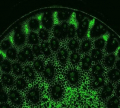Anti-Arabinogalactan-Protein, AGP (monoclonal, clone JIM16)
From the laboratory of Paul Knox, Phd, University of Leeds, United Kingdom
- Product Info
-
Immunogen: Polysaccharide Arabinogalactan-protein (AGP) from Oryza sativa Sub class: IgM Host: Rat Clonality: Monoclonal Purity: Cell Culture Supernatant, with 0.05% sodium azide. Format: Liquid Quantity: 1 ml Storage: Store at -20°C. Make aliquots to avoid repeated freeze-thaw cycles, Please, remember to spin tubes briefly prior to opening them to avoid any losses that might occur from material adhering to the cap or sides of the tubes. Tested applications: ELISA (ELISA), Immunofluorescence (IF) Recommended dilution: 1: 10 (IF) - Reactivity
-
Confirmed reactivity: Higher plants - Additional Information
-
Additional information (application): Antibody is recognizing carbohydrate epitope containing Β-linked glucuronic acid. - Background
-
Background: The plant cell wall surrounds the plant cell as a complex network of polysaccharides classed as: cellulose, hemicelluloses and pectic polysaccharides and glycoproteins. Anchored to or embedded into plant cell wall are other polymers, like: lignin, suberin or cutin. Arabinogalactans can be found in plants as free glycans, or attached to rhamnogalacturonan-I or protein backbones. - Product Citations
-
Selected references: Albornos et al. (2025). Reduction of galactose side chains in type II arabinogalactan alters homogalacturonan methyl esterification in Arabidopsis thaliana seed coat mucilage.Planta. 2025 May 24;262(1):4. doi: 10.1007/s00425-025-04717-x. - Protocols
- Immunofluorsecence as described in: Developmental complexity of arabinan polysaccharides and their processing in plant cell walls Verhertbruggen Y, Marcus SE, Haeger A, Verhoef R, Schols HA, McCleary BV, McKee L, Gilbert HJ, Knox JP., The Plant Journal (2009) 59, 413–425.
- Reviews:
-
This product doesn't have any reviews.
Accessories

This set contains 3 Cell wall antibodies of your choice, chosen from a drop down menu.

From the laboratory of Paul Knox, Phd, University of Leeds, United Kingdom

From the laboratory of Paul Knox, Phd, University of Leeds, United Kingdom

From the laboratory of Paul Knox, Phd, University of Leeds, United Kingdom

From the laboratory of Paul Knox, Phd, University of Leeds, United Kingdom
